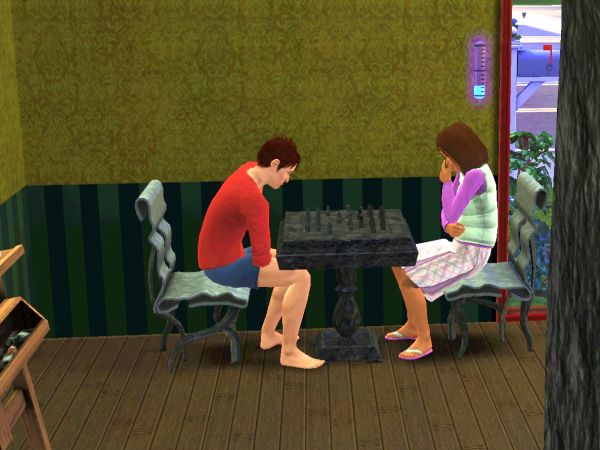
In The Sims 3, you may live long enough to master numerous skills. In real life, most of us would be happy with one. But how do we do it?
I mentioned a while ago that you can become a grandmaster of chess – or the equivalent in any other venue – by dedicating approximately 10 000 hours to pushing yourself. (More when you are older, probably, but somewhere around this.) This may be all you need to know, but the actual working of the mind in these cases is also known. I have written about it some years ago, but let me write it again in new words, without looking back. If you are like me, it should interest you.
Usually when we do mental work, we use a combination of short term and long term memory. Short term memory is very limited, but essential in all works of the mind. How limited? Most humans can only remember 7 things at a time. 7 random digits, random letters, random words or random icons. Note that the information content is not an issue. The number of elements remains the same. But if the element itself is complex and unfamiliar, so you must remember it as a sequence of parts, these parts will go from the quota of 7.
You can exceed the limit for a very short time, usually enough to dial a phone number, but even this has its limit, and not much higher. By brain training games you can over time raise your limit to 8, and some people have a slightly higher limit naturally. It does not sound like much, but it is actually a pretty dramatic benefit. Even when operating automatically, the mind depends on short term memory to connect and compare different elements.
But this is not how mastery works. Masters do not need to have a 8 or 9 element short term memory, although it obviously would not hurt. But they use a completely different approach: In the words of Scientific American, the masters seem to use long term memory like short term memory. How do they do that?
Let me take an example: the numbers 3 2 7 1 2 1 9 5 8 2 6. Millions of people would not be able to recall this even when they had finished reading it. Of those who could, most would have forgotten it before they had finished singing one verse of their national anthem (which I assume is nearly automatic in most people). I, on the other hand, remember this easily after 7 hours of various reading, writing, playing and exercising. And rightly so: For I am born on the 27th of December (month 12) 1958. This leaves me with a whopping 3 elements to remember: The number 3, and my birth date, and the number 26. (Yes, I think of numbers in this range as a unit, rather than as two digits. After all, I’ve been 26 once!)
Now you may say this is cheating, and you are absolutely right. But the thing is, a grandmaster of chess knows every realistic combinations of pieces on a chess board like his birth date, more or less. That is where those 10 000 hours went, after all. They did not disappear in the fog. He has memories of them, conscious or otherwise. That particular pattern of pieces on the board gave him a victory once, a loss another time. They are all familiar to him, real and obvious. So for him, a particular combination of pieces on the board – or even a sequence of these – is remembered as one unit. Thus, his long term memory seems to be projected into the short term memory, because he can hold several extremely complex data structures in his mind at the same time, which is just plain impossible to you or me.
This seems a bit similar to how we automate “muscle memory” to perform body skills without needing to think about the details, like biking or driving a car. Generally, humans are really good at automating. This is not necessarily a good thing: Once we are past our youth, we tend to automate so much of our life that the days just pass in a blur, without us needing to be actually present in them. But what the skillful masters do is automate steadily more of the lower-order functions of the mind, whereas they continue to expand their skill at a higher level. If you reach a stage where you have automated everything you do, and you don’t push forward, your progress stops.
So, pretty obvious once you see it, I guess. But doing it is another matter. Even if we know how, few of us are going to master even a single skill in our lifetime, much less surpass numerous destinies while we are alive.
